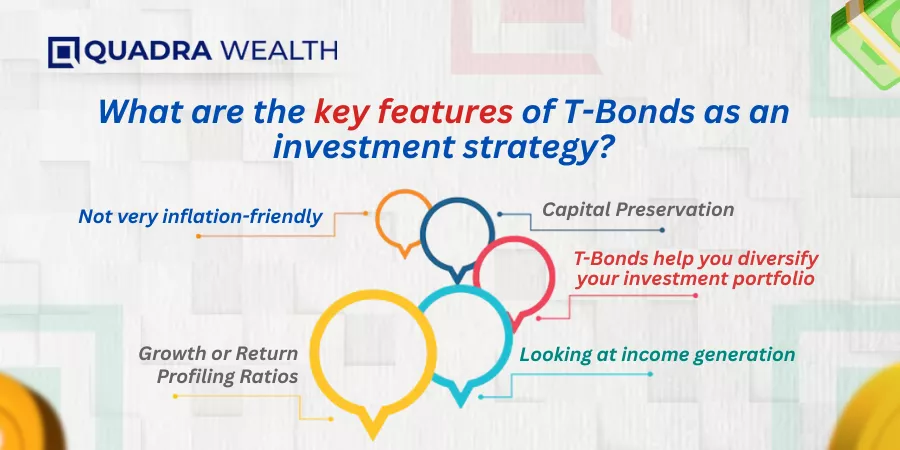Introduction
Are you trying to find a quick-fix option that can help you grow your investment portfolios at a steady pace? Well then, you are pretty much at the right place here.
As a beginner, you must be a newbie investor who wants to play it safe, isn’t it? Then, opting for the government bonds or treasury bonds is the ideal choice for you. These bonds can be bought for affordable denominations, and you can lock your capital vault for over 20/25/ 30 years.
Regardless of what happens inside the market, you are assured of getting your principal amount back. Plus, you get your coupon payouts once every 6/12 months indeed. These coupons can double up as a passive source of income over your regular earnings through your 9-5 job.
On a similar parlance, let us unveil more detailed insights that entail the blog topic- ‘Are Treasury Bonds A Good Investment?’ Helping you get started further on the same:
What are Treasury Bonds or T-Bonds- Meaning and Conceptualization Explained
Treasury Bonds or T-Bonds are safely owned government-issued securities that are 100% capital protected. These are fixed-income securities that are issued by the US Department of the Treasury to subscribers who stay in and around the US.
These are fixed-income securities over a long-term investment horizon. This can be a good investment option if you consider your financial goals, risk tolerances, and other financial metrics that go in favor of your purchase of T-Bonds.
As your t-bonds are issued by the US Government over a maturity period of 20/30 years, you would be paid a fixed rate of interest once every 6 months or so. As the T-bonds are issued under the credit capacity of the US Government, there is virtually no question of a default on these investment options.
What are the key features of T-Bonds as an investment strategy?

These are the primary features of T-Bonds as an investment strategy. Helping you through a rundown of the same:
Capital Preservation
These are Government-owned fixed-income securities that come to you with literally zero default risk. In other words, your capital investment would be protected 100 percent despite volatile market conditions. Therefore, t-bonds are highly preferred by traditional or conservative retail investors like pensioners, retirees, and senior citizens who look for capital protection and receive fixed rates of return periodically.
T-Bonds help you diversify your investment portfolio
T-Bonds help you diversify your investment portfolios as they work inversely proportional to how equities or stocks work. When you add assets to your allocation, you must include capital safe investments so that the losses that are triggered via buying or selling of trading derivatives are offset with these principal-protected investments. Therefore, the overall value of your investment basket or wealth basket does not incur capital erosion on the whole.
Looking at income generation
T-Bonds help you garner fair or modest rates of return on your capital investment. You get periodic coupons once every six or twelve months. This way, if you are a pensioner or retiree, you have something to add to your savings account.
Growth or Return Profiling Ratios
T-Bonds might not offer a very great scope for capital appreciation as compared to the potential upscale you may receive on equities or stocks. However, the growth of your portfolio happens at a steady pace with fixed rates of return.
Not very inflation-friendly
T-Bonds merely return your principal investment, and your interest earnings happen every 6 months or 12 months throughout the tenor of your investment portfolio. Therefore, this is not a very inflation-protective wallet unless you have some tax-saving plans in place.
Let’s find out the core benefits of owning T-Bonds
These are the core benefits of owning T-Bonds. Helping you through with a rundown of the same:
Safer havens of investment
T-Bonds are safer havens for investment portfolios as these are 100 percent capital safe, and you are not likely to get a hit via the credit issuance default risks whatsoever. The government owns these bonds and fixed-income securities that would repay your funds by the time your portfolio is up for redemption. And, you get fixed rates of return on the portfolio throughout the term of the asset.
Used globally as a secure form of investment
U.S.-issued T-Bonds are considered the safest form of investment globally. As these are bonds backed by the US Government, you find that the investment portfolios are ideal even during market uncertainties like a declaration of a pandemic or recession.
Getting hands-on with a predictable source of income
T-Bonds give you regular access to periodic coupon payouts that are made every 6 months or 12 months. This way, you get a predictable or fixed rate of return regardless of market conditions. Therefore, this is an investment portfolio that is highly attractive to the conservative segment of investors, like pensioners or retirees.
Inflationary Protection via TIPS
TIPS can be abbreviated as Treasury-Inflation-Protected Securities. You can embed the TIPS feature in T-Bonds so that the inflationary concerns are offset by making financially aided principal adjustments. The rates of return can also increase to offset the purchasing power concerns that arise due to growing inflation. Therefore, when you ask the product issuing firm to embed TIPS, you can protect your capital and interest earnings against rising inflationary environments.
A bounty of tax benefits that are accrued with T-Bonds
Your T-Bonds are exempt from all forms of local and state taxes, although these are subject to federal income tax that remains applicable on the final amount you redeem from the portfolios.
What are the downsides of owning T-Bonds?
These are the drawbacks or downsides of owning T-Bonds. Let us have a rundown on the same:
Interest rate risk
The prices of T-Bonds fall while the interest rates rise. This can be quite detrimental, impacting the capital vault of investors. For instance, if you had invested in 3% yield bonds and the market moves to 5%, then the market value of your bonds can depreciate visibly indeed. When you try to sell these T-Bonds inside secondary markets prior to their redemption, you incur a significant amount of capital losses on account of the same.
Inflation Risk
When you get modest rates of returns via fixed income securities such as t-bonds, you lose the real-time value of them owing to growing inflation. Therefore, with an increased surge in purchase prices of goods and services, your returns on investment are like dropping a pinch of salt into the ocean, and it does not hold good for you on an investment platter.
Provides you with lower yields as compared to other types of investments
T-Bonds provide you with relatively lower rates of return as compared to the yields you can receive via real estate, mortgage, or other forms of corporate bonds. Therefore, this is an investment option that is not so very suitable for high-growth portfolios.
Opportunity cost that pretty inevitable
T-Bonds come to you with a huge lock-in period of 20-30 years in a row. Therefore, when you tie your capital over such a huge time-horizon period, you lose your opportunity to gain better returns through other forms of investments.
For whom are T-Bonds most suitable?

T-Bonds are the most suitable if you belong to the following category of investors. Let us have a rundown of each consideration to help you understand better:
Investors who want a safe and long-term income
T-Bonds are meant for those of you who want a 100% safety of your principal investment and are in need of stable returns on the investment once every 6 or 12 months in the form of coupons. Retirees, conservative retail investors, pensioners, and senior citizens prefer investing in t-bonds.
For those of you requiring a hedge against market uncertainties
T-Bonds are absolutely capital-safe investments that ideally suit those of you who want to bypass market volatilities or market uncertainties over changing interest rates, rising and falling prices of equity assets. When you buy t-bonds, you are assured of receiving your principal money back irrespective of market volatility.
For those of you needing a more balanced portfolio
When you create wealth-generation baskets using t-bonds, capital-protected fixed income securities, and corporate bonds, you have made yourself a well-balanced and diversified portfolio indeed. You can also receive dividends, coupons, and interest payouts, and thereby diversify your source of income potential as such.
The Bottom Line
Treasury Bonds or T-Bonds are capital-safe investments that are backed by the US Treasury. Therefore, you get 100 percent of your investment back while the portfolios are up for redemption. However, these are investment options that offer modest rates of return over corporate bonds, real estate shares, or other equity assets. You must understand the pros and cons of your investment option before you decide to sign on the dotted lines. What are your thoughts on this? Do let us know in the comments below!
Frequently Asked Questions or FAQs
How do bond prices work when you embed treasury inflation-protected securities or TIPS norms?
Answer: The bonds function in a more stable environment when you embed the TIPS facility in T-Bonds in a highly inflation-affected environment. The bonds must garner returns on investment commensurate with the increasing rate of inflation to help investors capitalize on the returns the investment portfolio makes.
Can treasury bills only be bought and sold from the treasury market? Explain how the buying-selling operandum for t-bonds works!
Answer: Treasury bills can be bought from fiduciary brokers or government websites alone. Municipal bonds or stock market equities provide a better income stream, while the t-bond market provides capital security to investors as such. The t-bills operate in a bond market that operates differently from mutual fund companies or etfs, as these are completely risk-free and are tailormade for conservative investors, and the liquidity levels in the money market also differ exponentially between the equities market and the t-bills market for many investors on the whole.
Will bond funds fluctuate?
Answer: Investors seeking far less fluctuation trends prefer t-bonds as against equities or commodities, as the bonds are capital-safe. However, changing interest rates or fierce market volatility do impact the prices of t-bonds as well.






